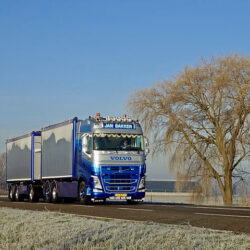Scania wins Greener Supply Chain Award

Scania recently won the Greener Supply Chain Award for its environmentally friendly transport operations in Germany and the Benelux countries. The prize was presented at the first-ever Automotive Logistics Awards ceremony, which was held on 12 June 2018 in Bonn, Germany. The judges were particularly impressed by how the world-leading provider of transport solutions has integrated sustainability into its transport procurement process, calling it “a very holistic approach that puts sustainability at its focus, rating CO2 emission equally with costs and quality”.
The jury also praised Scania’s systematic and focused approach towards greener supply chains. “Scania has clearly changed the culture of its organization to deliver this consistent and measured benefit. Seriously impressive,” they concluded. Besides that, Scania was recognized for its process of optimizing transport flows with regard to quality, cost and CO2 reduction and determining the best balance between these three factors. This approach was initially applied in procuring transport services in Germany and the Benelux countries but has now been extended to all European countries.
Assessing CO2 reduction potential
The optimization process starts with Scania assessing the potential for reducing CO2 along each transport route. The company then considers the possible alternatives (e.g. rail transport or gas) per route and per country. Scania subsequently requests quotes from various carriers and chooses the one that strikes the best balance between quality, cost and CO2 reduction. In terms of results, Scania has already reduced its carbon footprint by 20 percent and achieved the added benefit of an 8 percent cost reduction in Germany and the Benelux countries, and across Europe carbon emissions have been reduced by between 10 and 60 percent. Scania’s transport landscape has changed from exclusively diesel towards a new balance between diesel, renewable fuels and rail solutions, and the company is reexamining the situation every three years to keep pace with the ever-increasing availability of renewable fuels.










